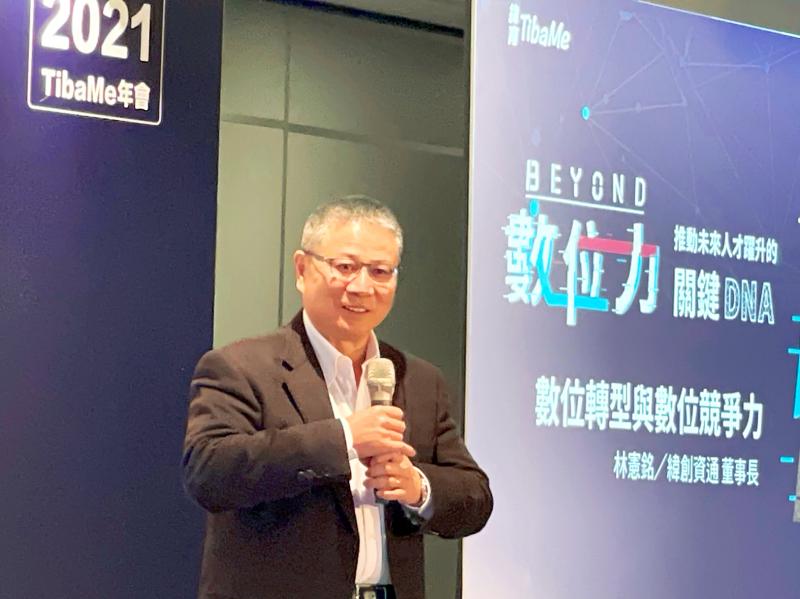Wistron Corp (緯創), one of Apple Inc’s iPhone assemblers, yesterday reported that first-quarter net profit plunged 95 percent quarter-on-quarter and 84 percent year-on-year to NT$113 million (US$4.05 million), dragged by non-operating losses.
That compared with a net profit of NT$726.71 million a year earlier and NT$2.32 billion in the fourth quarter of last year.
Earnings per share (EPS) dipped to NT$0.04, from NT$0.26 a year earlier and NT$0.83 the previous quarter.

Photo: CNA
Wistron attributed the losses to its holdings of Luxshare Precision Industry Co (立訊精密), whose share price has plunged about 40 percent since it bought 3 billion yuan (US$466 million) of the cable and connector supplier’s common shares in July last year.
Last year, Wistron sold two of its subsidiaries — Wistron InfoComm Manufacturing (Kunshan) Co (緯新資通崑山) and Wistron Investment (Jiangsu) Co (緯創投資江蘇) — to Luxshare for 3.3 billion yuan. The stock purchase, which came after the sales, gave Wistron an 0.81 percent stake in Luxshare, which it described as a “strategic partner.”
Wistron’s operating income surged 62 percent year-on-year to NT$3.08 billion last quarter, but declined 28 percent from a quarter earlier.
Consolidated revenue slid 2 percent year-on-year to NT$177.3 billion last quarter.
The company also reported consolidated revenue for last month of NT$68.22 billion, down 2.01 percent from a year earlier.
QUANTA
Quanta Computer Inc (廣達電腦), the world’s largest laptop contract maker, reported consolidated revenue of NT$84.84 billion last month, down 10.2 percent month-on-month, but up 1.7 percent year-on-year.
Cumulative revenue in the first four months of this year was NT$353.79 billion, up 29.3 percent year-on-year.
The company shipped 6.1 million laptops last month, down 7.58 percent month-on-month, but up 32.6 percent year-on-year.
COMPAL
Fellow laptop contract manufacturer Compal Electronics Inc (仁寶) experienced a sharper month-on-month drop in revenue, which fell 17.38 percent month-on-month and 5.25 percent year-on-year to NT$89.35 billion.
Compal shipped 4.4 million laptops last month, down 20 percent from a month earlier, but up 2.33 percent year-on-year.
The company said that demand remained strong, but tight components supply, including CPUs, monitors and power supplies, affected shipments.
Compal expects to ship more than 47 million laptops this year, at least 10 percent more than it did last year.
Contract electronics manufacturer Inventec Corp (英業達) yesterday posted sales of NT$38.19 billion for last month, down 6.8 percent month-on-month and 22.5 percent year-on-year.
Cumulative sales in the first four months of the year rose 8.75 percent year-on-year to NT$150.04 billion.

CAUTIOUS RECOVERY: While the manufacturing sector returned to growth amid the US-China trade truce, firms remain wary as uncertainty clouds the outlook, the CIER said The local manufacturing sector returned to expansion last month, as the official purchasing managers’ index (PMI) rose 2.1 points to 51.0, driven by a temporary easing in US-China trade tensions, the Chung-Hua Institution for Economic Research (CIER, 中華經濟研究院) said yesterday. The PMI gauges the health of the manufacturing industry, with readings above 50 indicating expansion and those below 50 signaling contraction. “Firms are not as pessimistic as they were in April, but they remain far from optimistic,” CIER president Lien Hsien-ming (連賢明) said at a news conference. The full impact of US tariff decisions is unlikely to become clear until later this month

Popular vape brands such as Geek Bar might get more expensive in the US — if you can find them at all. Shipments of vapes from China to the US ground to a near halt last month from a year ago, official data showed, hit by US President Donald Trump’s tariffs and a crackdown on unauthorized e-cigarettes in the world’s biggest market for smoking alternatives. That includes Geek Bar, a brand of flavored vapes that is not authorized to sell in the US, but which had been widely available due to porous import controls. One retailer, who asked not to be named, because

CHIP DUTIES: TSMC said it voiced its concerns to Washington about tariffs, telling the US commerce department that it wants ‘fair treatment’ to protect its competitiveness Taiwan Semiconductor Manufacturing Co (TSMC, 台積電) yesterday reiterated robust business prospects for this year as strong artificial intelligence (AI) chip demand from Nvidia Corp and other customers would absorb the impacts of US tariffs. “The impact of tariffs would be indirect, as the custom tax is the importers’ responsibility, not the exporters,” TSMC chairman and chief executive officer C.C. Wei (魏哲家) said at the chipmaker’s annual shareholders’ meeting in Hsinchu City. TSMC’s business could be affected if people become reluctant to buy electronics due to inflated prices, Wei said. In addition, the chipmaker has voiced its concern to the US Department of Commerce

STILL LOADED: Last year’s richest person, Quanta Computer Inc chairman Barry Lam, dropped to second place despite an 8 percent increase in his wealth to US$12.6 billion Staff writer, with CNA Daniel Tsai (蔡明忠) and Richard Tsai (蔡明興), the brothers who run Fubon Group (富邦集團), topped the Forbes list of Taiwan’s 50 richest people this year, released on Wednesday in New York. The magazine said that a stronger New Taiwan dollar pushed the combined wealth of Taiwan’s 50 richest people up 13 percent, from US$174 billion to US$197 billion, with 36 of the people on the list seeing their wealth increase. That came as Taiwan’s economy grew 4.6 percent last year, its fastest pace in three years, driven by the strong performance of the semiconductor industry, the magazine said. The Tsai